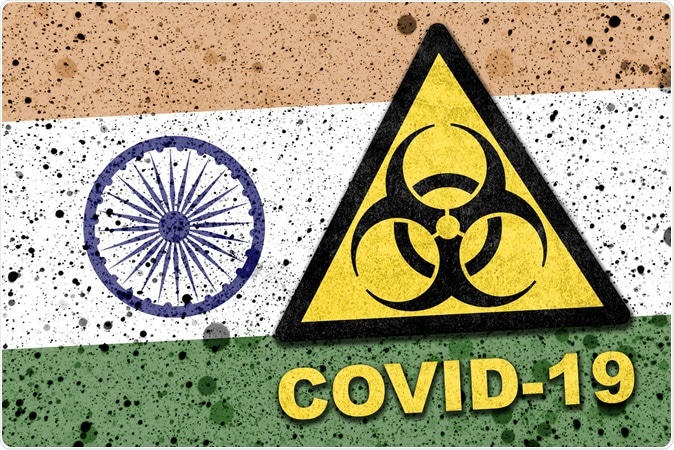India, with its 1.3 billion population, is struggling to contain the spread of novel coronavirus infection or COVID-19. COVID-19 has been confirmed in 378,601 individuals worldwide, and there are now 16,505 deaths worldwide attributed to this pandemic that has been ravaging the planet since the start of January 2020. As of today, India has 499 confirmed cases and ten deaths.

Coronavirus COVID-19 outbreak in India. Image Credit: Konstantin Egorychev / Shutterstock K By
Prime Minister Narendra Modi urged the people of India to observe a people’s curfew called the “Janata curfew” on 22nd March 2020. This was a 14-hour lockdown between 7 am and 9 pm this Sunday. The efforts were made to shut down the cities and prevent gatherings in the hope of curbing the spread of the infection.
On Sunday, at the end of the curfew, which was mostly successful in various parts of the nation, Modi applauded the efforts and said, “Janata curfew will end at 9 pm, but it doesn’t mean we should start celebrating. It’s the beginning of a long battle. People shouldn’t come out of houses in states which have announced a lockdown. In the rest of the states, if it is not very important, don’t come out of your houses.”
Railways and transport shut down
There has been an influx of COVID-19 positive cases from various states as well as from abroad. In a bid to stop COVID-19 positive cases from traveling in crowded trains and spreading the infection as they move from one place to another, 168-year-old Indian Railways has for the first time since its inception announced a shut down since 22nd March 2020 at midnight till 31st March 2020. Nearly 23 million people utilize the Indian railways to get from one place to another in a single day. All international flights have been suspended to stop the entry of persons from abroad. Starting on the 23rd, domestic flights allowing interstate movements have also been stopped. Interstate bus services have also been shut down for many states. This has ensured a shutdown of the borders of all the states with active COVID-19 cases.
Lockdown in other cities
Capital of India, New Delhi, has reported six new cases of COVID-19 infection that have been acquired from locally infected persons. Chief Minister of Delhi, Arvind Kejriwal announced a lockdown of the Capital city starting 6 am on 23rd March as a continuation of the curfew on the 22nd. This would last till 12 am on 31st March 2020, he announced.
He has announced that borders of Delhi would be shut down to all but essential commodities, and there would be no public transport on the roads. Gatherings of more than four people at a time would be barred, he added. People who have returned from abroad, especially from nations that are heavily affected with COVID-19, are being quarantined for a period of a fortnight. These homes are being marked by stickers to prevent the individuals from venturing out during their period of isolation.
Several other states, including West Bengal, Uttar Pradesh, Punjab, Maharashtra, Jammu and Kashmir, Bihar, Andhra Pradesh, Jharkhand, Himachal Pradesh, Assam, Meghalaya, Rajasthan, etc. and 80 districts across the country have announced lockdowns starting on 23rd March 2020. All public gatherings, local elections, weddings, etc. have been postponed for now.
Community spread
India still is at the crux of stage 2 and stage 3. Stage 2 indicates infection in a person who has traveled abroad. It also means infection in a person who is related to or has come in contact with a person who has returned from international travel and has tested positive. Stage 3 indicates community spread where the cases recorded are spread via local transmission. India saw a rise of 113 cases on 22nd March 2020, which could indicate a local spread. Officials have warned that this has occurred in a remote town of Rajasthan. The progress to stage 3 or community spread has accelerated the process of lockdown for many of these regions say the officials.
Fewer numbers tested and way forward
One of the reasons for the still few numbers of cases in India says experts are due to the less than twenty thousand individuals tested for the infection. At present, the Indian Council of Medical Research (ICMR) has allowed several laboratories to test for COVID-19 and widen the net to detect more cases. The ICMR has suggested testing for the infection in persons who are in the hospital with respiratory diseases, including pneumonia and in all persons who have returned from abroad. ICMR has allowed several private labs to conduct the test capping the price at 4,500 rupees ($60).
Expert speak
Lav Agarwal, a senior health ministry official, said at a press meet in New Delhi on the 22nd, “Our biggest challenge is how do we break this chain of transmission.” He added that there had been a “big increase in cases recently.” He has said that the different states have been asked to ramp up their efforts to combat the coronavirus pandemic. He has said that all states have been asked to earmark hospitals for treating patients with coronavirus infection.
Salute to the frontline workers
During the Janata curfew on 22nd March, Modi had appealed to the Indians locked within their homes to come out onto their balconies at 5 pm and applaud to show their appreciation for the health care workers and other frontline servicemen who would be maintaining the essential services during the trying times ahead.